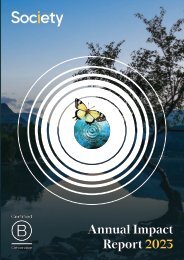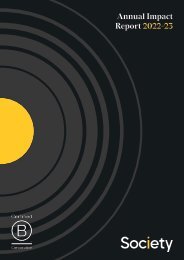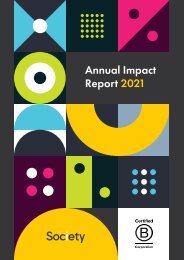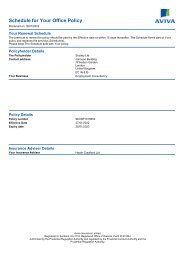Society's Artciles of Association
Create successful ePaper yourself
Turn your PDF publications into a flip-book with our unique Google optimized e-Paper software.
Authority to capitalise and appropriation <strong>of</strong> capitalised sums<br />
36.—(1) Subject to the articles, the directors may, if they are so authorised by an<br />
ordinary<br />
resolution—<br />
(a) decide to capitalise any pr<strong>of</strong>its <strong>of</strong> the company (whether or not they are<br />
available for distribution) which are not required for paying a preferential<br />
dividend, or any sum standing to the credit <strong>of</strong> the company’s share premium<br />
account or capital redemption reserve; and<br />
(b) appropriate any sum which they so decide to capitalise (a “capitalised sum”)<br />
to the persons who would have been entitled to it if it were distributed by way <strong>of</strong><br />
dividend (the “persons entitled”) and in the same proportions.<br />
(2) Capitalised sums must be applied—<br />
(a) on behalf <strong>of</strong> the persons entitled, and<br />
(b) in the same proportions as a dividend would have been distributed to them.<br />
(3) Any capitalised sum may be applied in paying up new shares <strong>of</strong> a nominal amount<br />
equal to the capitalised sum which are then allotted credited as fully paid to the<br />
persons entitled or as they may direct.<br />
(4) A capitalised sum which was appropriated from pr<strong>of</strong>its available for distribution<br />
may be applied in paying up new debentures <strong>of</strong> the company which are then allotted<br />
credited as fully paid to the persons entitled or as they may direct.<br />
(5) Subject to the articles the directors may—<br />
(a) apply capitalised sums in accordance with paragraphs (3) and (4) partly in one<br />
way and partly in another;<br />
(b) make such arrangements as they think fit to deal with shares or debentures<br />
becoming distributable in fractions under this article (including the issuing <strong>of</strong><br />
fractional certificates or the making <strong>of</strong> cash payments); and<br />
(c) authorise any person to enter into an agreement with the company on behalf <strong>of</strong><br />
all the persons entitled which is binding on them in respect <strong>of</strong> the allotment <strong>of</strong><br />
shares and debentures to them under this article.<br />
PART 5<br />
DECISION-MAKING BY SHAREHOLDERS<br />
ORGANISATION OF GENERAL MEETINGS<br />
Attendance and speaking at general meetings<br />
37.—(1) A person is able to exercise the right to speak at a general meeting when that<br />
person is in a position to communicate to all those attending the meeting, during the<br />
meeting, any information or opinions which that person has on the business <strong>of</strong> the<br />
meeting.<br />
(2) A person is able to exercise the right to vote at a general meeting when—<br />
(a) that person is able to vote, during the meeting, on resolutions put to the vote<br />
at the meeting, and<br />
(b) that person’s vote can be taken into account in determining whether or not<br />
such


















